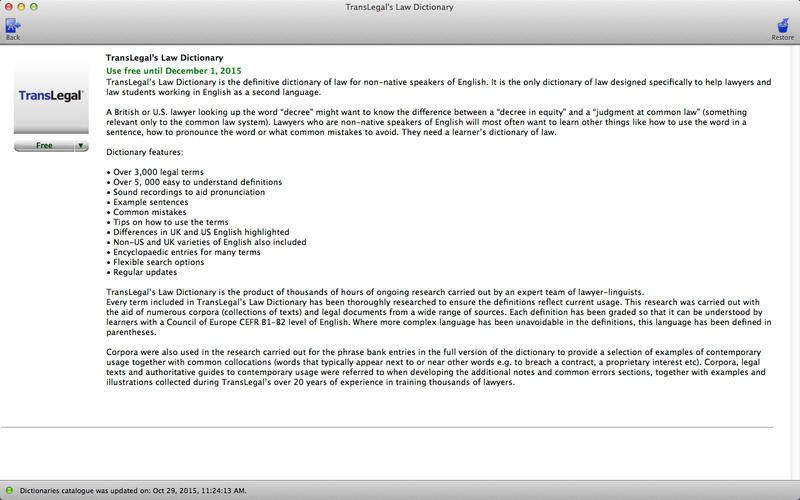
TransLegal’s Law Dictionary
*** Preview full wordlist and sample entries, as well as experience the most advanced search and learning features of dictionary before buying ***
TransLegal’s Law Dictionary is the definitive dictionary of law for non-native speakers of English. It is the only dictionary of law designed specifically to help lawyers and law students working in English as a second language.
A British or U.S. lawyer looking up the word “decree” might want to know the difference between a “decree in equity” and a “judgment at common law” (something relevant only to the common law system). Lawyers who are non-native speakers of English will most often want to learn other things like how to use the word in a sentence, how to pronounce the word or what common mistakes to avoid. They need a learner’s dictionary of law.
Dictionary features:
• Over 3,000 legal terms
• Over 5, 000 easy to understand definitions
• Sound recordings to aid pronunciation
• Example sentences
• Common mistakes
• Tips on how to use the terms
• Differences in UK and US English highlighted
• Non-US and UK varieties of English also included
• Encyclopaedic entries for many terms
• Flexible search options
• Regular updates
TransLegal’s Law Dictionary is the product of thousands of hours of ongoing research carried out by an expert team of lawyer-linguists.
Every term included in TransLegal’s Law Dictionary has been thoroughly researched to ensure the definitions reflect current usage. This research was carried out with the aid of numerous corpora (collections of texts) and legal documents from a wide range of sources. Each definition has been graded so that it can be understood by learners with a Council of Europe CEFR B1-B2 level of English. Where more complex language has been unavoidable in the definitions, this language has been defined in parentheses.
Corpora were also used in the research carried out for the phrase bank entries in the full version of the dictionary to provide a selection of examples of contemporary usage together with common collocations (words that typically appear next to or near other words e.g. to breach a contract, a proprietary interest etc). Corpora, legal texts and authoritative guides to contemporary usage were referred to when developing the additional notes and common errors sections, together with examples and illustrations collected during TransLegal’s over 20 years of experience in training thousands of lawyers.
_____
Search features:
• Search through dictionary headwords.
• Fulltext search mode – to search for usage examples.
• ‘Similar words’ or ‘Wildcard’ search functions: find words even if you are not sure about the correct spelling.
• Morphology module to find words in any grammatical form.
• Look up from other applications - while working in other applications you can easily and quickly look up any desired word without leaving that application.
• Search history - while you are using the dictionary, it saves all looked up and viewed words/phrases in the History.
Learning features:
• Audio pronunciations recorded by native speakers.
• Table of English irregular verbs.
• Word forms.
Interface features:
• Quick access to virtual keyboard.
• Synchronization of dictionary language with the keyboard input source.
• Favorites - to quickly access frequently searched words.
• Enlarge or reduce font size for your comfort.
Dictionary compatibility: Mac OS 10.7 (Lion) and higher.
_____
About TransLegal
Founded in 1989, TransLegal has grown to become the leader in Legal English, providing a wide range of products and services to the international legal community, including Legal English testing, online Legal English courses and resources, live seminars and training, translation of legal documents and the publication of Legal English materials.



